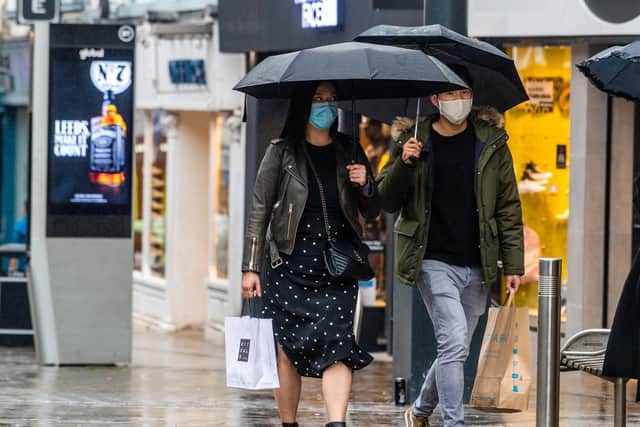West Yorkshire will not enter Tier 3 restrictions on Monday
and live on Freeview channel 276
West Yorkshire Combined Authority announced the news in a tweet on Saturday night.
The region will instead follow national restrictions as of Thursday.
A statement from leaders is set to follow.


Advertisement
Hide AdAdvertisement
Hide AdThe tweet said: "Following the Prime Minister's statement at 7pm tonight, West Yorkshire will not be entering Tier 3 restrictions on Monday 2 November.
"The region will follow the national restrictions on Thursday.
"A statement from Leaders will follow."
Addressing the nation tonight, earlier than anticipated due to leaks to the media, the Prime Minister warned the NHS was at risk of being overwhelmed, with deaths heading towards “several thousands” and the level of the first peak.
Mr Johnson chaired Cabinet this afternoon where the new measures were agreed, before he spoke with Labour leader Sir Keir Starmer and Commons Speaker Sir Lindsay Hoyle.
Advertisement
Hide AdAdvertisement
Hide AdHe will head to the Commons on Monday to outline the measures and take questions from MPs, before a vote on the new rules on Wednesday ahead of them coming into force at 00.01am on Thursday.
Mr Johnson said: “I am under no illusions about how difficult this will be."
Ministers were told that the incidence rate for coronavirus was growing and that the NHS was under increasing pressure, with an average of one in 100 people having Covid-19.
On the current trajectory Government scientists on the Scientific Pandemic Influenza Group on Modelling (SPI-M) have assessed the NHS will reach its fixed and surge bed capacity during the first week in December, even after elective procedures are cancelled.
Advertisement
Hide AdAdvertisement
Hide AdThey said the growth in the virus is now national, and although worse in the North, it was spreading everywhere.
Under the measures announced tonight people can only leave home for specific reasons including for education, work if they cannot work from home, for exercise and recreation outdoors, for medical reasons, to escape injury or harm, to shop for food and essentials and to provide care for vulnerable people.
Schools, colleges, and universities are to remain open.
While individuals can also meet with one other person at a social distance in somewhere such as a park, but only if both people are solo.
And it is being urged that workplaces should stay open where people cannot work from home, for example in construction and manufacturing, however non-essential shops and leisure venues will all be closed, as will pubs, bars and restaurants.
Advertisement
Hide AdAdvertisement
Hide AdTakeaway services and click and collect can continue, and support bubbles will remain intact.
And furlough will return at up to 80 per cent of pay for the duration of the national measures.
The introduction of national restrictions marks a dramatic shift in Government policy, as the Prime Minister has until now resisted pressure to reintroduce nationwide restrictions.
Members of the Government’s Scientific Advisory Group for Emergencies (Sage) have backed the introduction of more stringent measures.
Advertisement
Hide AdAdvertisement
Hide AdProfessor Sir Jeremy Farrar said the consequences of sticking with the current “insufficient” restrictions would be “much worse” than going for a second lockdown.
The director of the Wellcome Trust said: “The sooner we act, the sooner we can start to recover. It will be a very difficult few weeks now and no one can underestimate the toll that will take on people.
“But the consequences of sticking with the current insufficient restrictions would have been much worse.”
Sage member Professor Calum Semple told BBC Radio 4’s Today programme: “For the naysayers that don’t believe in a second wave, there is a second wave.
Advertisement
Hide AdAdvertisement
Hide Ad“And, unlike the first wave, where we had a national lockdown which protected huge swathes of society, this outbreak is now running riot across all age groups.”
Professor John Edmunds said the only way to have a “relatively safe” Christmas is to take “stringent” action now to bring the incidence of the virus “right down”.
It comes after a senior Government scientific adviser said it is “definitely too late to think that the two-week circuit-breaker on its own will sort this out”.
“It would bring it down a bit but it wouldn’t be enough to bring (the R value) right down. A two-week circuit-breaker would have an effect but now almost certainly it would need to go on for longer to have a significant effect.”
Advertisement
Hide AdAdvertisement
Hide AdBritish Chambers of Commerce director general Adam Marshall described the new restrictions as “a devastating blow” to business communities.
Market confidence has been “hit hard by the unclear, stop-start approach” taken by governments across the UK during the pandemic.
He said: “Many firms are in a much weaker position now than at the start of the pandemic, making it far more challenging to survive extended closures or demand restrictions.”
He called for Government support for businesses facing hardship, whether through loss of demand or closure, to be boosted.
Advertisement
Hide AdAdvertisement
Hide AdHe said: “The Government must not squander the time afforded to them through another lockdown to enable mass testing and fix test and trace systems – which hold the key to a lasting exit strategy for both public health and the economy.”
Comment Guidelines
National World encourages reader discussion on our stories. User feedback, insights and back-and-forth exchanges add a rich layer of context to reporting. Please review our Community Guidelines before commenting.